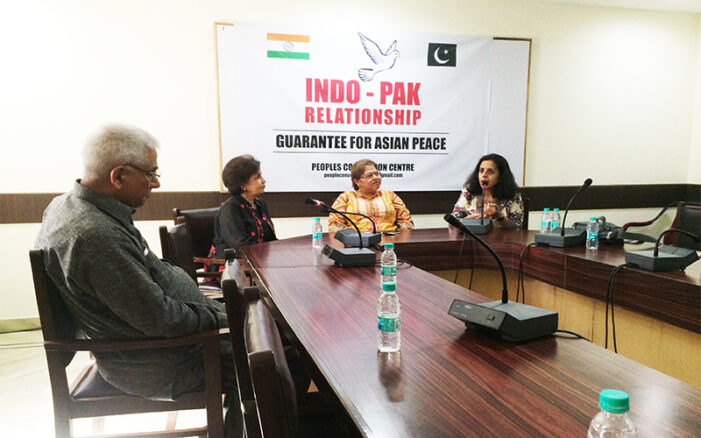The conclusion is invariably the same whenever people from across the Radcliffe line share any common space either in Lahore, Chandigarh or New Delhi, what to talk of Amritsar. The only option with India and Pakistan is to move forward as it is the economic cooperation and trade relations that would pave the way to end decades long bitterness inherited from the partition of this sub-continent in 1947. This feeling is especially stronger in the two Punjabs.
This was the theme too at the interaction two senior Pakistani journalists Mariana Babbar, a foreign policy expert and Ayesha Siddiqa, strategic affairs columnist, had with a select group moderated by Indian Express Editor (North) Nirupama Subramanian who has covered Pakistan extensively, here today at the People’s Convention Centre.
An interesting comment was made by Babbar, a Pakhtoon, in the context of Punjab-Punjab relationship saying in case her state opted for similar interaction with Afghanistan, the same would be viewed differently.
Ayesha referred to the instances of Pakistan business houses putting pressure on the government to open Wagha border and gave specific examples of Suzuki Motors, auto-parts industry and 2-wheeler industry.
Yet an important aspect of the economy that she shared was that Pakistan was expecting heavy investment from India in the farm sector of that country during the next about ten years. The pipelines might take time as both the neighbours would have to resist US strong arm tactics in the energy field.
The sailing would not be smooth. Ayesha observed this was the border having only war and peace at the same time as while trucks carrying goods cross over from Attari-Wagha border, another truck might be transferring body bags across the Line of Control.
The Pakistani businessmen had high hopes on Prime Minister Narendra Modi in the run up to the 2014 Lok Sabha election as he was perceived to be a strong a decisive leader. The narrative has not moved in the expected direction.Babbar made a significant suggestion saying if the two prime ministers can meet, let the army chiefs and RAW and ISI chiefs from the two sides also meet to sort out the issues rather than blaming each other. The two spy agencies could sort out several issues at the informal level.Yet another significant aspect that has closed Pakistan’s options now is the increasing threat from the IS and in this context, Babbar was very clear saying other the countries would have to go in for working relationship. It is the threat from the IS that has not forced the strategic planners to go into various options as the threat is real.
Pakistan Army has normally been blamed by tension between the two countries but there have been moments when perception had changed. Babbar recalled the tragedy when more than 300 Pakistani soldiers were buried alive under avalanche on Siachen glacier. Standing there, Pakistan army chief general Ashfaq Parvez Kayani had commented with tears in his eyes, “This can’t go on”.
India is seen as arrogant neighbor but it must be realized that it is India that would lose in case democracy is derailed in Pakistan. The Pakistani guests raised a simple question as to what had India gained and asked, “Pathankot (terrorist attack)”? The issue that is raised normally in India to whom to talk to in Pakistan in the context of army’s role.
It was pointed out that new myths were being created about the army with the propaganda that the police were not competent to control the situation as Pakistan heads towards radicalization. At one level, the situation is same across the border with fascist tendencies raising their heads in the name of ultra-nationalism under the Modi government too.
While rulers in Pakistani have been raising passions against India over the years, the significant aspect revealed was that it has never become part of electoral discourse in any of the elections there. Ayesha perceived rough ride for Prime Minister Nawaz Sharif till next elections as Pakistan army is partly political organisation as well.Everything is not lost and the way forward is through Attari-Wagha border as economies of both the countries need each other. Stress would have to be on building economic cooperation. If India and Pakistan have to meet their energy needs, they would have to join hands. Agreement has already been arrived at on Turkmenistan-Afghanistan-Pakistan-India pipeline with terminal at Fazilka in Punjab. It is the technicalities that are being worked out.
Jagtar Singh


You must be logged in to post a comment Login